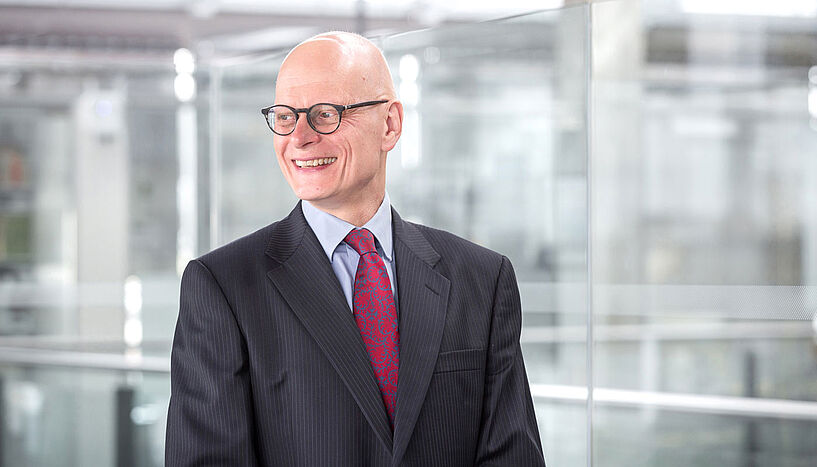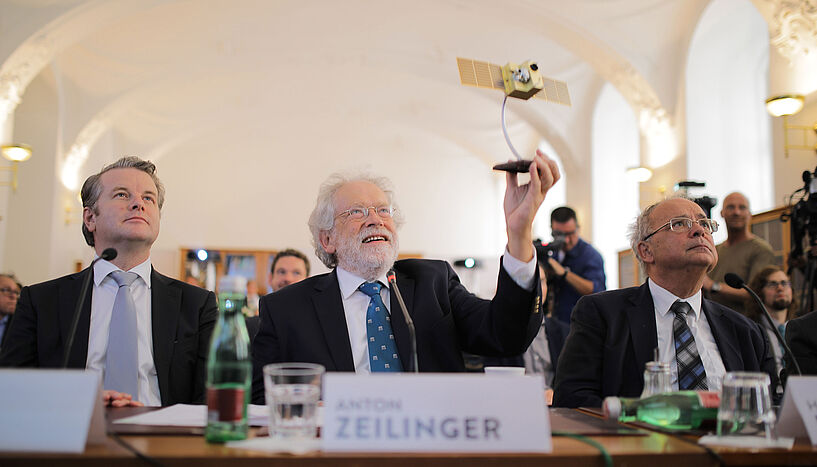Ian Walmsley: "Science ought to be shared broadly"
| 18. Oktober 2019
"Science provides a response to a profoundly human need to understand the way the world works", says Ian Walmsley in his interview with uni:view. (© Ian Walmsley)
Ian Walmsley is Chair in Experimental Physics at the Imperial College London. On Tuesday, 29 October, he will give a public talk at the Main Ceremonial Hall of the University of Vienna. In the following interview he talks about his scientific contributions on quantum optics and ultrafast optics.
uni:view: Your scientific contributions on quantum optics and ultrafast optics are impressive. What was personally your biggest discovery?
Ian Walmsley: I'm not sure I can claim any discoveries of lasting significance, but one of several things that I am pleased with is the development of a method to measure really short light pulses – called SPIDER. This had been an outstanding problem for several decades, since there was not prospect of developing standard detectors that could determine the duration, let alone the shape, of pulses in the regime of femtoseconds – one femtosecond is a million-billionth of a second. If time is money, then this is roughly the ratio of a five Cent coin to the national debt of the USA. The reason I am proud of it is that the idea for how to make such a measurement came to me from an undergraduate course I was teaching in optical engineering, something that was new to me initially. For me it was a good illustration of how the combination of having a research question in mind, and yet having to think about things differently for teaching, led to an interesting solution.
Vienna Graduate Conference on Complex Quantum Systems 2019
Keynote talks by world-leading experts from abroad will be accompanied by tutorials and alumni and student presentations on the research activities within the Vienna Doctoral Program on Complex Quantum Systems (CoQuS). Ian Walmsley will participate in the Vienna Graduate Conference on Complex Quantum Systems and give a public talk at the Main Ceremonial Hall of the University of Vienna.
Monday, 28 October – Wednesday, 30 October 2019
Ceremonial Hall, University of Vienna
More information
uni:view: Light has had a huge influence on the development of physics – can you give us some examples how optics did and will shape the world?
Walmsley: There are many! Sometimes light provides the fundamental phenomenon that answers an important question. For example, quantum optical experiments (some undertaken here in Vienna) were critical in establishing that it is not possible even in principle to assign a complete set of properties to individual objects – their colour, shape, etc. This lack of what are called "local hidden variables" is profoundly counter intuitive. And sometimes light provides the right technology to enable other discoveries. An example of that is the optical interferometer, which uses the wave-like properties of light to measure very, very tiny distortions in space-time. It was the application of this instrument that showed that the "aether" did not exist and opened the way to the Special Theory of Relativity, and the more recent application of the same design (on a much bigger scale) that allowed the observation of gravity waves from colliding black holes, as predicted in the General Theory of Relativity.
uni:view: You will give a public talk at the University of Vienna – why is the engagement of researchers with wider audiences important?
Walmsley: Science is one of the important ways in which humans acquire knowledge of the natural world. It provides a response to a profoundly human need to understand the way the world works, and is perhaps one of the things we can be truly proud. Science is a core part of our culture, and it ought to be shared broadly, in ways that are understandable and accessible.
It's amazing to see some of the discoveries and ideas that come from this endeavour – the world is a much stranger and more interesting place than everyday experience might lead you to believe. I am constantly thrilled by what people around the world are able to learn from scientific experiments, and I would like everyone to share this experience.
Of course, it's also evident that understanding can be used to make the world a better place through its application to invention. That dual role of knowledge acquired by science is important for everyone's everyday life.
uni:view: We tried to explain the superposition principle in an animated short film. What is your "easy" explanation for the superposition principle?
Walmsley: That's a fun video! You show atoms behaving as waves in your movie, and I often start with the idea of wave motion too. An example that people know from their own experience are water waves on the surface of a pond. If you drop a stone into the pond, a circular wave propagates away from the splash. Now do it with two stones near one another. The wave pattern you see shows places where the two waves add and places where they cancel. That gets the idea of superposition in mind. The next step is hard: why should atoms (or cats!) be associated with waves? And what kind of waves are they? I don't have an easy explanation for that. It is just the way it is. And it is so crazy that you'd better look for a lot of evidence that it is plausible. That's what scientists have been doing for the last century – testing quantum mechanics in all ways that they can. Everything we've tried indicates that this is the right idea. And it is so crazy that we are still asking whether we are fooling ourselves - that this idea is just an accounting tool - something we use just to do calculations, and not something real. That debate is always a good one for after the lab, when you've got a beer in your hand.
uni:view: Thank you for the interview! (hm/red)
Ian Walmsley is Provost of Imperial College London and Chair of Experimental Physics. As an expert in ultrafast and quantum optics he contributed to advances in different fields, such as spectroscopy, cryptography or quantum computing.
Public Talk "From Fleas to Qubits"
On Tuesday, 29 October 2019, at 19:00, Ian Walmsley will give the public talk "From Fleas to Qubits: How optics shapes physics" at the Main Ceremonial Hall of the University of Vienna. Please register for the public talk by Sunday, 20 October 2019.
Invitation to the public talk
Registration to the public talk



